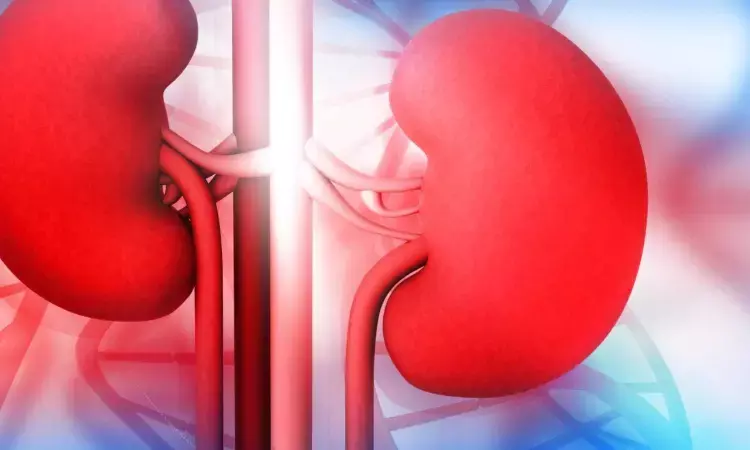- Home
- Medical news & Guidelines
- Anesthesiology
- Cardiology and CTVS
- Critical Care
- Dentistry
- Dermatology
- Diabetes and Endocrinology
- ENT
- Gastroenterology
- Medicine
- Nephrology
- Neurology
- Obstretics-Gynaecology
- Oncology
- Ophthalmology
- Orthopaedics
- Pediatrics-Neonatology
- Psychiatry
- Pulmonology
- Radiology
- Surgery
- Urology
- Laboratory Medicine
- Diet
- Nursing
- Paramedical
- Physiotherapy
- Health news
- Fact Check
- Bone Health Fact Check
- Brain Health Fact Check
- Cancer Related Fact Check
- Child Care Fact Check
- Dental and oral health fact check
- Diabetes and metabolic health fact check
- Diet and Nutrition Fact Check
- Eye and ENT Care Fact Check
- Fitness fact check
- Gut health fact check
- Heart health fact check
- Kidney health fact check
- Medical education fact check
- Men's health fact check
- Respiratory fact check
- Skin and hair care fact check
- Vaccine and Immunization fact check
- Women's health fact check
- AYUSH
- State News
- Andaman and Nicobar Islands
- Andhra Pradesh
- Arunachal Pradesh
- Assam
- Bihar
- Chandigarh
- Chattisgarh
- Dadra and Nagar Haveli
- Daman and Diu
- Delhi
- Goa
- Gujarat
- Haryana
- Himachal Pradesh
- Jammu & Kashmir
- Jharkhand
- Karnataka
- Kerala
- Ladakh
- Lakshadweep
- Madhya Pradesh
- Maharashtra
- Manipur
- Meghalaya
- Mizoram
- Nagaland
- Odisha
- Puducherry
- Punjab
- Rajasthan
- Sikkim
- Tamil Nadu
- Telangana
- Tripura
- Uttar Pradesh
- Uttrakhand
- West Bengal
- Medical Education
- Industry
HIF prolyl-hydroxylase inhibitors safe for anaemia treatment in CKD patients: Study

China: A recent study has shed light on cardiac and kidney-related adverse effects of HIF-PHIs (hypoxia-inducible factor prolyl hydroxylase inhibitors) among patients with chronic kidney disease (CKD).
Findings from the systematic review and meta-analysis, published in the American Journal of Kidney Diseases, showed that kidney or cardiac-related adverse events occurring in the HIF-PHI groups were comparable to placebo or erythropoiesis-stimulating agent (ESA) groups.
Anaemia is a frequent complication seen in patients with CKD and is linked with reduced quality of life and increased risk of hospitalizations, cardiovascular disease, and mortality. Currently used treatment for anaemia in CKD is erythropoiesis-stimulating agents (darbepoetin and epoetin), along with iron supplementation according to the clinical practice guidelines. While ESAs reduce the requirement for blood transfusions, high-dose ESAs have been linked with an increased risk of advancement to end-stage kidney disease (ESKD), cardiovascular events, and death. Owing to these concerns regarding ESAs safety, anaemia in patients with CKD stage 3b-5, who do not receive dialysis, is left untreated or often delayed.
Hypoxia-inducible factor prolyl hydroxylase inhibitors, novel oral agents for anaemia management in CKD, are a potential alternative treatment for anaemia that activate hypoxia-inducible factor (HIF) transcription factors. ESAs require parenteral administration, while HIF-PHIs are orally administered.
Against the above background, Wei Jing Liu and the research team from China aimed to investigate the cardiac and kidney-related adverse effects of HIF-PHIs in CKD patients.
For this purpose, the researchers conducted a systematic review and meta-analysis of randomized controlled trials (RCTs). The study included RCTs comparing HIF-PHIs to a placebo or an ESA with primary outcomes of adverse events related to the heart and kidney. Patients with CKD and anaemia not receiving maintenance dialysis were included. RCTs were evaluated for eligibility by two independent reviewers, and relevant data were extracted.
The study led to the following findings:
· Twenty-three studies with 15,144 participants were included. The researchers did not observe significant differences in the risk of cardiac disorders between the HIF-PHIs group and the placebo (RR=1.02; moderate certainty) or ESA groups (RR=1.06; low certainty).
· The authors did not observe any significant difference in the risk of kidney-related adverse events between the HIF-PHIs group and the placebo (RR=1.09; moderate certainty) or ESA groups (RR=1.00; low certainty).
· In the HIF-PHIs group, the occurrence of hyperkalemia and hypertension was more significant than in the placebo group (RR=1.35; high certainty and RR=1.25; high certainty, respectively).
· In the HIF-PHIs group, hypertension was lower than in the ESA group (RR=0.89; moderate certainty).
Findings showed that HIF-PHIs did not remarkably increase the risk of kidney or cardiac-related adverse events, severe adverse events (SAEs), kidney failure events, or death in CKD patients with anaemia not receiving dialysis. HIF-PHIs may be associated with a raised risk of hyperkalemia and hypertension versus a placebo. However, HIF-PHIs may be linked with a reduced risk of hypertension and a relative risk of hyperkalemia versus ESA.
"Further studies should consider the limitations of the study to investigate the impacts of cardiac and kidney-related adverse events of HIF-PHIs for anaemia," the authors concluded.
Reference:
Zheng Q, Wang Y, Yang H, Sun L, Zhang P, Zhang X, Guo J, Liu YN, Liu WJ. Cardiac and Kidney Adverse Effects of HIF Prolyl-Hydroxylase Inhibitors for Anemia in Patients With CKD Not Receiving Dialysis: A Systematic Review and Meta-analysis. Am J Kidney Dis. 2022 Nov 14:S0272-6386(22)01014-9. doi: 10.1053/j.ajkd.2022.09.014. Epub ahead of print. PMID: 36396085.
Dr Kamal Kant Kohli-MBBS, DTCD- a chest specialist with more than 30 years of practice and a flair for writing clinical articles, Dr Kamal Kant Kohli joined Medical Dialogues as a Chief Editor of Medical News. Besides writing articles, as an editor, he proofreads and verifies all the medical content published on Medical Dialogues including those coming from journals, studies,medical conferences,guidelines etc. Email: drkohli@medicaldialogues.in. Contact no. 011-43720751


